John Kerry Looks Back – And Ahead
Air Date: Week of October 5, 2018
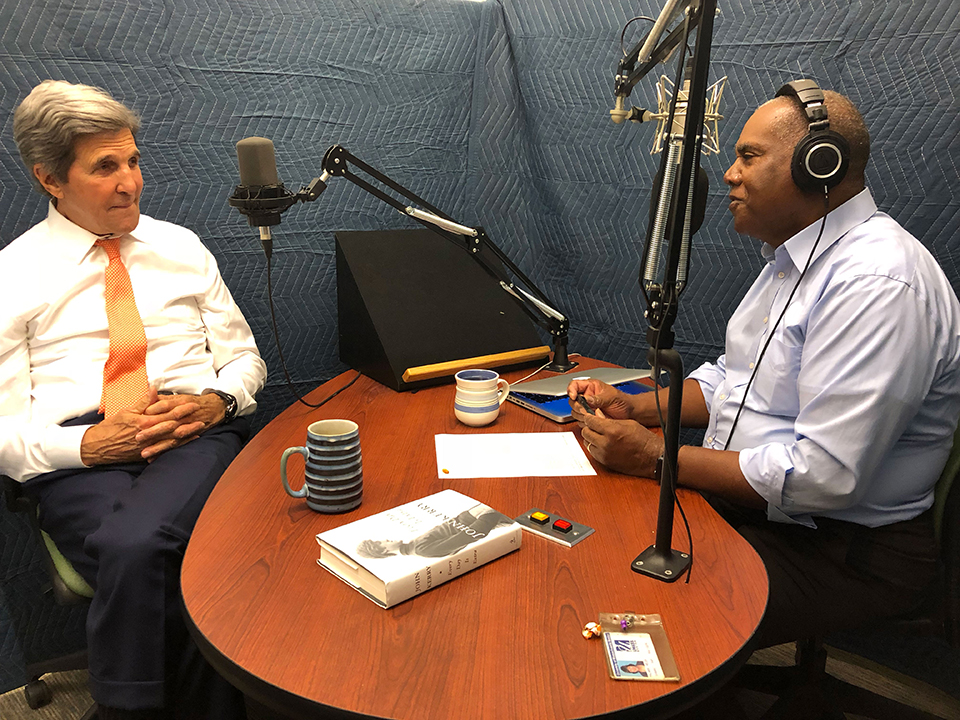
Secretary John F. Kerry talks about his 2018 memoir Every Day is Extra with Living on Earth Host Steve Curwood. (Photo: Jenni Doering)
Former Secretary of State John Kerry is the author of a new bestselling book, called Every Day Is Extra. At its heart is a message of urgency about the need to address the climate crisis. Yet Kerry remains optimistic about the ability of the United States’ democratic system to tackle the most pressing global issues of today. In a conversation with Host Steve Curwood, Kerry discusses his longtime love of the ocean and concerns about ocean health, and says that what America needs now is for citizens to get out and campaign for politicians willing to move the country in the right direction.
Transcript
CURWOOD: It’s Living on Earth. I’m Steve Curwood.
John Kerry is looking confidently into the future, even as he reflects back on a life in public service, which ranges from being the face of Vietnam Veterans Against the War to a Democratic nominee for President and Secretary of State. Secretary Kerry writes about challenges facing the world, focusing on climate change in the final chapter of his 600-page memoir titled Every Day Is Extra. And even in the face of President Trump’s opposition to climate action, John Kerry remains optimistic. He spent his youthful summers in and on the waters of Buzzards Bay in Massachusetts, which gave him a lifetime attachment to the sea. Over the decades he’s played key roles in legislation and international negotiations on climate change, acid rain, and ocean health. Secretary Kerry, welcome to Living on Earth!
KERRY: Happy to be here. Thank you.
CURWOOD: So, if there's one thing from your book "Every Day is Extra," it is your love of the ocean why does the ocean call to you in such a strong way?
KERRY: Well, I'm a son of Massachusetts I think it calls to all of us, sons and daughters. We are blessed to be people of the sea here in the state of Massachusetts and we love Cape Cod, we love the islands, and I learned as a kid. I was raised around Buzzards Bay and I used to just clam and fish and play in the water, learn how to sail, do all these wonderful things. But I learned about under the water, and I then was a big Phillip Cousteau fan and used to tune in. My mother was in the enormous conservationist and environmentalist, and I grew up with a sense of responsibility understanding that the ocean is fragile. It's not impervious to the things we humans do to it.
CURWOOD: And as I recall from your book, in your fortunate childhood, you were on one of the Elizabeth islands, you were on Naushon.
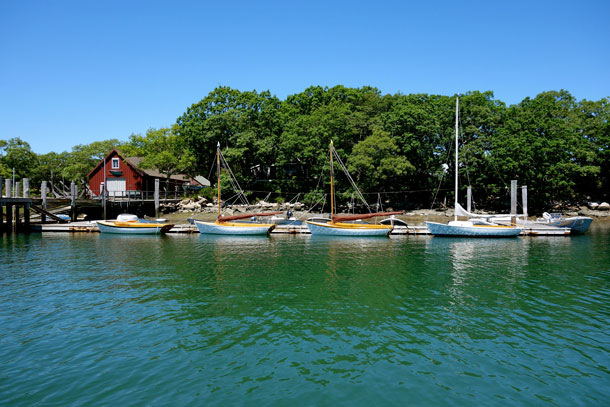
Above, sailboats docked at Hadley’s Harbor on Naushon Island. Kerry’s love of the ocean was shaped in part by summers spent on the seven-mile-long island just off Cape Cod. (Photo: Putneypics, Flickr CC BY-NC 2.0)
KERRY: Yeah.
CURWOOD: And then you come out of Woods Hole and you can see it on your way to Martha's Vineyard if you like. It's a great place to have your toes in the sand as a kid.
KERRY: Yeah, it's a gift beyond description, and it was wonderful to be able to be there, but I think that everywhere on our Cape, people would get to experience the beauty of our sand dunes, of our low tides, of the enormous beaches, the remarkable vision that President Kennedy had to keep great Cape Cod seashore national monument. So, we're very lucky people and our history goes way back. Obviously, I mean everybody during the era of 1700s, 1800s, early 1600s came here on a boat, and we have always had a tie in our history to the sea. In our merchant efforts, the China trade...
CURWOOD: The cod on top of the statehouse.
KERRY: The cod, whaling. And you know we don't have cod now. I mean, this ought to be a message to everybody. It's Cape Cod but there are no cod...or very very few and precious few, and it's a tragedy if we don't start paying attention to how we manage these kinds of things. We could see an economic impact on our state.
CURWOOD: So, what do we need to do today to take care of our oceans?
KERRY: I think there are three primary challenges: number one climate change, which is caused by greenhouse gases which fall in the ocean and acidify the ocean which has a negative impact on the growth of clams, crustaceans, shells and bleaches out spawning grounds and coral reefs and so forth around the world. We don't know all the impacts. We know it has an impact. We don't know the rate of impact. We don't know where you could have a precipitous catastrophic impact, and so that's why we owe it particular respect and concern.
The second great impact is pollution, general pollution. People build. They build near the ocean. There's what we call non-source point pollution. You have runoff, you have gasoline runoff from stations, you have oil runoff, you have pesticide runoff, you have high nitrate runoff which affects the level of oxygen in the water, and therefore the fish and plants and fauna in the ocean, and we have 500 dead zones around the world in the oceans today, dead zones, nothing grows because of what has happened with this overload. And also, pollution generally, effects the fish, you have plastic getting into marine mammals into birds. I've seen film of sharks and or porpoises and or whales dragging nets around and dragging plastic around. It's crazy.
And then finally, we have overfishing. We have too much money chasing too few fish and that's one of the reasons that we don't have cod anymore here. Eight of the top fisheries of the world are now overfished, out of the sort of 18 or so fisheries, principal ones, and the others are at or near max. So, with 450 million Chinese who have come out of poverty into the middle class who now have discovered blue tuna and sushi, with 400 million Indians likewise and people around the world gaining in income and therefore appetite, we have a huge challenge, and already about 12 percent protein that people get in the world comes from fish, so there's a huge demand for fish as a food stock and increasingly we're going to see pressure on that. So, those are the biggies, but the pollution is just stunning. I mean, if we continue at the rate we're going, there will be more plastic than fish in the ocean in 20, 30 years.
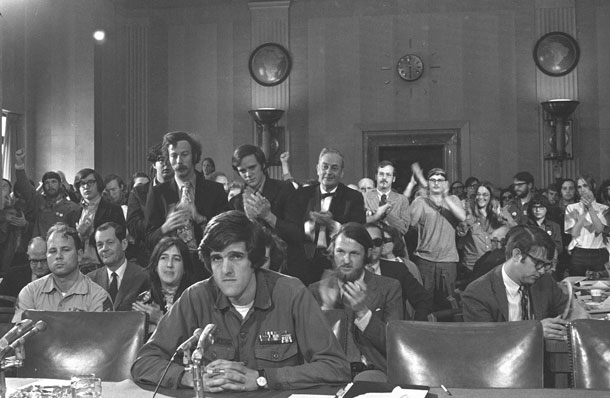
Former Navy Lieutenant John Kerry spoke out against the Vietnam War as part of VVAW (Vietnam Veterans Against the War) during his testimony before the US Senate Foreign Relations Committee on April 21, 1971. (Photo: AP Images/Henry Griffin)
CURWOOD: Now, of course, you've had a storied career most recently as a diplomat. In your background, I think you spent some time in France and Switzerland as a kid, your dad was a diplomat. But when it comes to the ocean you've had some special concerns, and I just want to quickly ask you about two. One there's something called the Law of the Sea Treaty. It was something that the United States and folks from Massachuetts just like Elliot Richardson worked on years ago which we've never ratified. And now there's talk of having some sort of a high seas treaty that would govern...what is half of the world that is not in any jurisdiction.
KERRY: Correct, it's called the high seas, and the high seas do not belong to any particular nation, but they get egregiously overfished by renegade fishers, pirate fisherman, and years ago Senator Ted Stevens and I went to the United Nations to try to ban the driftnet fishing. We succeeded, it was banned, but today you have pirate fishermen, renegade fishermen, who go out with a draft net and a drift net is literally thousands of miles of monofilament netting that they drop behind the boat, drag along. It kind of strip mines the ocean and as much as two-thirds of the catch, certainly 50 percent, is called waste catch. They just throw it overboard. So, it's changing the ecology of the ocean by...imagine the vision of you see a strip mine on coal or the land, you see it just ravaging everything around it. This is what a driftnet will do and then sometimes it breaks off and it becomes what we call the ghost net because it just fishes on its own. When it's weighted down with carcasses, it sinks to the bottom and scavengers clean it off, and it rises to the top again until it gets tangled in a whale or tangled in the propellers of some boat. It's a scourge and we have no enforcement on those high seas or very little enforcement, I should say, occasionally someone's military ship goes through it and you can check on who's who and what's happening and you can certainly mark what ships are there fishing.
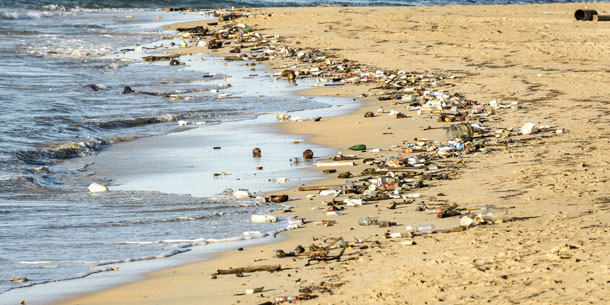
Kerry says, “If we continue at the rate we’re going there’ll be more plastic than fish in the ocean in 20, 30 years.” (Photo: rey perezoso, Flickr CC BY-SA 2.0)
CURWOOD: So, we're overfishing. Talk to me about the climate and your concerns about climate change.
KERRY: We face a massive challenge of dealing with climate refugees. The prime minister of the Fiji Islands, I just met with him the other day at an event in California where he pointed out that there are literally taking refugees from other islands, and they themselves are now planning how to move, where can they go to be safe. They are going to lose their nation state which is these islands. Increased fires, increased floods, more moisture in the air because of the warming of the ocean, more intensity in the storms because of that moisture we're seeing it in the hurricanes. We've seen last year just three hurricanes - Harvey, Irma and Maria - cost the taxpayer $265 billion dollars, one third of the Defense Department budget for a year. Think of that. Three storms and it's going to get worse, so people who sit there and say well we can't afford to do something or we can't it's crazy, it is far more expensive to do nothing or to do very little than to actually step up and try to deal with the problem of climate change. And why? Because the answer to the problem of climate change is energy. Energy policy. We have the solutions. Solar today is less expensive than coal, but people are still using coal. We shouldn't be. We can't be using coal because it's the dirtiest fuel there is, and we've got to move off of coal on to the alternative renewables. They’re there, and we need the leadership that does it and regrettably this president and his administration and not only not dealing with climate but they're lifting the restrictions we have on air quality because of automobiles. They're lifting the restrictions we had on coal dust going into water, into rivers and lakes. They're putting it back. God knows, I don't know who the constituency is for this, but that's what they're doing. Well...you do know the constituents. It's coal companies and it's big corporations and so forth, and we have to fight back against it.
CURWOOD: Your book, which you call "Every Day is Extra" could almost be about the climate itself, that every day we wait to deal with it.
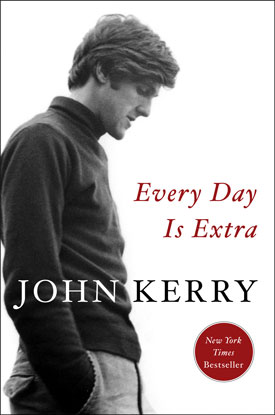
Every Day Is Extra caught public attention on the New York Times Best Seller List. (Photo: Courtesy of Simon & Schuster)
KERRY: Well, it is about the climate. The last chapter of my book, which I'm very partial to, it's the wrap up chapter, is called protecting the planet, and I deal with my efforts to get the Paris agreement passed. I mean, I went to China, brought the Chinese into the agreement with us because I watched the failure in Copenhagen four years earlier where it fell apart because China was leading the less developed countries in a different direction. China and the United States were able to lead the world to make an agreement, that's what we have to get back to. Instead of bashing China every day with new sanctions - now there are problems with China's management of the market - I'm not ignoring that but I think there's a better way to deal with it than the current administration.
CURWOOD: So, let's drill down on that. I believe over the years I've seen you just about every of the major climate conferences. What inspired you to think that you could find a way to cut a deal with the Chinese? Because between us and the Chinese, what, it's 40, almost 50 percent of the world's emissions...
KERRY: Well, sort of just shy of 50. It's about 45 percent.
CURWOOD: Yeah, so what inspired you to think that there would be a way that you could get them to join us?
KERRY: Because I believe in logic. I believe in common sense, and I believe in the power of persuasion, and I believed that it was in China's interest. I mean it's hard to get countries to do things that they never perceive are in their interest, but I thought it was in their interest because I had spent enough time working with lower level Chinese bureaucrats on the subject of climate. I knew what they were thinking and I knew they were hearing from their own constituencies. I mean China is a one-party system, it's authoritarian, yes, but it's not immune to citizen opinion, and it's quite amazing really the way, in fact, it filters up through the mayors and the governors and into the ether of their politics. So, I was hearing from people that Chinese were increasingly upset with the quality of their water. They're upset with the quality of their air. We were posting the daily air quality on the embassy in Beijing, and people were tuning in like crazy to our embassy to find out what the air quality was, and the Chinese didn't love it, but we did it. It had an impact, so they wanted to take care of their people. It's that simple. They really knew, but they did it because politically it's survival. They knew it was important to their ability to be able to meet the people's interests, which is basic politics. We haven't been doing that in America by the way. People's interests are not being met in our own country, and that's why our democracy is in trouble. That's a whole different diversion will go there in this instance.
CURWOOD: Well, but do go there.
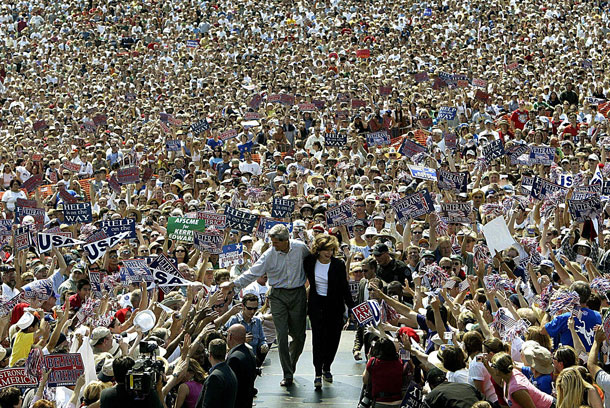
Kerry and his wife Teresa at a rally in Portland, Oregon in the final months of his campaign for President on August 13, 2004. He lost the election to incumbent President George W. Bush by a popular vote margin of 2.4%. (Photo: Getty Images / Hector Mata)
KERRY: It has to do with whether we get things done on the environment, whether we hold people accountable to what's happening now. The fact is that I believe people, individuals and kids here at UMass or at any college in this country are the key to being able to hold politicians accountable. And you can't do it sitting on your butt pretending somebody else is going to do it or it does not involve you. Everybody has to be involved in this. We have to go out and organize and make a difference. So, why do I say this with such conviction? I'll tell you why. Because we did it in 1970. In 1970, Rachel Carson had inspired many of us with the Silent Spring". We had the Woburn waste dump with toxic waste sites, we had a river, the Cuyahoga River in Ohio would light on fire literally, and people said I don't want to live next to this, I don't want to get cancer from the water I drink, I don't want to get emphysema or heart disease from the air quality.
So, we brought 20 million Americans out of their homes on one single day, Earth Day April 22, 1970, and we translated that into a political movement. We targeted the 12 worst votes in the United States Congress House of Representatives. Seven of the 12 lost their seats in the '72 election. And guess what? Boom, we had the Clean Air Act passed, the Safe Drinking Water, the Marine Mammal Protection, the Coastal Zone Management. The EPA was created and Richard Nixon signed it into law. Why? Because it was a voting issue. That's what we have to do today folks. There's no mystery to how we reclaim the direction and future of our country. It's by going out and working in our democracy, make it work. Last time in 2016 when Trump was elected, 54.2 percent of eligible voters came out to vote, 54.2. When Barack Obama was elected in 2008, it was 62.3 percent. That's the difference. The story of what we have today is not the people who did vote. It's people who didn't vote, and so I'm just saying to you we can change this but we have to do it now because the clock is ticking.
CURWOOD: John Kerry is a former Secretary of State, Candidate for President, a five-term United States Senator for Massachusetts, and his new book is called Every Day is Extra. We’ll have the rest of our conversation with Secretary Kerry next week, and you can find the full interview on our website, loe.org.
Links
U.S.-China Joint Announcement on Climate Change: Nov. 12, 2014
Living on Earth wants to hear from you!
Living on Earth
62 Calef Highway, Suite 212
Lee, NH 03861
Telephone: 617-287-4121
E-mail: comments@loe.org
Newsletter [Click here]
Donate to Living on Earth!
Living on Earth is an independent media program and relies entirely on contributions from listeners and institutions supporting public service. Please donate now to preserve an independent environmental voice.
NewsletterLiving on Earth offers a weekly delivery of the show's rundown to your mailbox. Sign up for our newsletter today!
 Sailors For The Sea: Be the change you want to sea.
Sailors For The Sea: Be the change you want to sea.
 The Grantham Foundation for the Protection of the Environment: Committed to protecting and improving the health of the global environment.
The Grantham Foundation for the Protection of the Environment: Committed to protecting and improving the health of the global environment.
 Contribute to Living on Earth and receive, as our gift to you, an archival print of one of Mark Seth Lender's extraordinary wildlife photographs. Follow the link to see Mark's current collection of photographs.
Contribute to Living on Earth and receive, as our gift to you, an archival print of one of Mark Seth Lender's extraordinary wildlife photographs. Follow the link to see Mark's current collection of photographs.
 Buy a signed copy of Mark Seth Lender's book Smeagull the Seagull & support Living on Earth
Buy a signed copy of Mark Seth Lender's book Smeagull the Seagull & support Living on Earth

